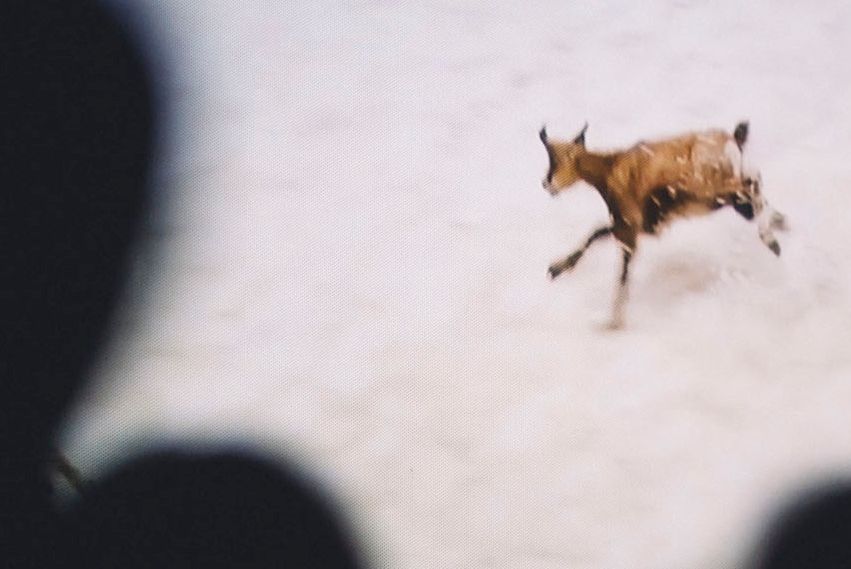
INTERVIEW: “A good festival producer should be invisible,” says Nikola Dašková, Head of AFO Production.
25. 2. 2019
AFO is drawing near; the festival commences in two months from 23 to 28 April. We interviewed the festival Head of Production, Nikola Dašková, on the latest additions to the festival, the ongoing endeavour to make it better and to deal with its growing popularity. “It is important for us to reach more people each year,” says Nikola. For more information, consult the following interview.
Working as a part of the festival management must be a year-around occupation. How long of a break did you enjoy after the last Academia Film Olomouc and when did the preparations of the next one start?
AFO only lasts one week in April, but the production work is yearlong. The festival is supported by several dozen institutions which require detailed and clear-cut requests for such support. Based on these requests, the institutions decide if and how they will support the festival. When AFO ends, we also have to prepare final reports for each sponsor. This is an unending cycle. Of course, we mustn’t forget the festival itself where we have a ton of things to deal with. For example, we decide on the budget for all the production areas and their supervisors, number of venues and accreditation design. At the same time, we are searching for new blood for our staff and try to improve and streamline the system of individual donors and reservations for seats and concerts.
Therefore, the greatest part of the work starts as the festival approaches, in autumn and spring. We try to have some rest during the summer, which is a more relaxing period for the festival’s production. Personally, I like to travel around the European capitals in summer. But the preparations for the next festival actually commence on the day following the end of the previous one when the whole team is full of ideas for improvement.
AFO 54 is fast approaching. What do you focus on the most right now as the Head of Production, about 2 months before the festival?
My priority is to keep the internal schedule in check and manage the administration according to the requirements of the Palacký University which we are part of. Among other things, we have scheduled the starting date for the festival accreditation, sent out invitations to the important guests, set up deadlines to finish the programme and filled in all the staff positions for this year.
Last year, AFO surpassed itself again in terms of attendance with more than 7,000 visitors. What kind of attendance are you expecting this year and how much can the number of visitors grow in the coming years?
Each organiser of ongoing cultural events tries to reasonably expand the attendance and improve the visitor experience. For us, the number of accredited visitors depends on the finances secured for the given year. We invest in creating a captivating programme and promotional campaigns, inviting prominent science popularisers from around the world and increasing the capacity of screening venues. When we clearly indicate the increase in venue capacity compared to the previous years and the attractiveness of the main and accompanying programme, there is an increase in accreditation. In turn, this helps us to reach out to exceptional partners and sponsors. For us, it is essential not to get stuck at some sort of a limit, but to try to reach out to more people every year. The same applies to AFO 54. Based on the 7,000 accreditations from last year, we expect up to 8,000 visitors coming this April. The increase in accreditations of 500 and 1,500 is good and manageable; more or less would mean a complication.
“For every cultural event organiser, it is natural to try to make things better.”
What do you do to prepare for the increase in audience? In recent years, all the seats were usually full without exception, do you plan to expand to other venues? If so, which ones?
We plan to accommodate more visitors by adding two entirely new screening venues. Those are the Moravian Philharmonic Reduta hall with 500 seat capacity and the Archdiocesan Museum Mozarteum hall with 120 seat capacity. At the same time, we try to provide the AFO visitors with an alternative to the main programme by expanding the accompanying programme. Apart from the unique exhibitions, evening music performances and late-night parties, we continue the AFO presentations at Horní Náměstí in cooperation with the KOMA Modular and the AFO Junior children programme on which we cooperate with the Fort Science and Na Cucky Theatre. This year, we will present an entirely new addition to the festival in the form of a virtual reality presentation for the entire duration of AFO. We plan to screen 360° films and some other more interactive formats. We plan to hold the closing ceremony in the Moravian Theatre with capacity of more than 400 seats. Besides the programme additions and the increase in screening venue seat capacity, we also plan several live streams of the lectures on social media. So, if you cannot get a seat for a talk by your favourite scientist, you won’t miss it. At the same time, the visitors can again pay for the reservation to get priority admission to the venue until five minutes before the start of the programme event.
This year, the visitors can expect a new mobile app. Why did you decide to change the app and how is it better than the previous one?
Besides making the festival bigger, it is very important for us to make it better and easier for the visitors to keep track of what’s going on. The new app developed by Skeleton is perfectly compatible with our website, but also Eventival, the new festival system, and Colosseum, the new reservation system. It allows us to effectively inform the visitors regarding their options and events to visit.
Is there something else the visitors should expect?
I would like to bring the attention to the 4Science conference intended for the science and audiovision professionals. This new and exclusive programme will provide the audience with a free programme event where the expert Alison Leigh will dynamically and inspirationally discuss the best recent movies and TV shows in the popular science genre. Another programme event called Films of the Future will offer the visitors a presentation of several popular science films in the making. It is an extraordinary and effective opportunity to gain insight to the world of screenwriters, producers, directors and scientists involved in the making of the remarkable films that we screen at AFO and continue to screen in the future.
What do you personally consider to be the biggest challenge and potential success of this year?
Some challenges for the production, such as increasing the capacity of venues and bilingual nature of the festival to appeal to the foreign audience and guests, are there every year. But AFO 54 brings along two very specific ones.
The first is to finally select our suppliers and partners so we can guarantee that AFO has the smallest possible negative impact upon the environment. These efforts include waste separation, avoiding harmful materials, such as cotton or plastic, and ensuring all-vegan refreshments for the staff and guests.
The second challenge is the personnel aspect of the festival production. For several years, me and my colleagues have been working hard to create such festival management structure for AFO which would result in the best team. It mainly concerns the balance between the experienced colleagues, who have intimate experience with the festival but often don’t reside in Olomouc, and the enthusiastic Palacký University students. What they lack in experience they compensate by introducing interesting new ideas while gaining valuable experience.

Academia Film Olomouc
28. – 3. 5. 2026
61ST INTERNATIONAL FESTIVAL OF SCIENCE DOCUMENTARY FILMS
Follow our social sites and explore our web to find out more about the programme. We will supply you with science dose by dose until the climax comes – AFO61.
Contact
Arts Centre of Palacký University
Academia Film Olomouc
Univerzitní 225/3
779 00 Olomouc
Czech Republic
afo@afo.cz
Quick links
Copyright © AFO 2000-2025 | web rostanetek.cz | admin







